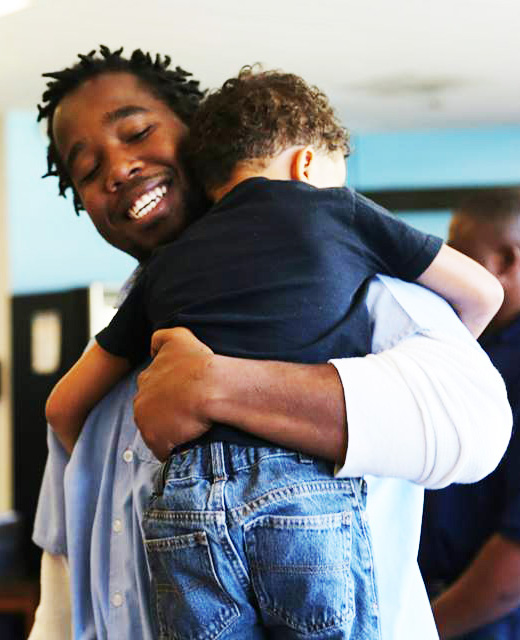Should I tell my kids the truth about where their daddy is?
Hello, friends! Today, I want to address the question, “Should I tell my kids the truth about where their daddy is?” It is a question I am asked all the time.
We all want to protect our children from pain. As moms, we would do anything we could to keep our children from being hurt. The hard truth is that we cannot stop our children from getting hurt.
From the first time they fall when they are learning to walk, our children learn from making mistakes. They learn to do something different the next time to avoid the pain of falling. That is how we all learn. We make a mistake. We suffer disappointment or pain. Then, hopefully, we learn from the mistake and try something else the next time.
"Letting go is the only way to let children learn for themselves"
It is really easy for us to see the value of letting go of our children’s hands when they are learning to walk. We know letting go is the only way they will learn to walk by themselves. If only every lesson in life were so obvious! We would always know how to respond. But it isn’t that simple. And when dad goes to prison, it is really complicated.
Seeing the pain that our children suffer when dad is suddenly removed from their everyday lives, our instinct is to protect them. But how? Should you tell them Daddy went to prison? Should you pretend that you don’t know where he is? Or perhaps you should make something up that will not hurt them as badly as the truth? Here it is. The moment you have to tell them SOMETHING. So, tell them the truth.
There is safety in knowing the truth
Yes, I know your children will be really hurt, confused, and angry. It isn’t fair that they should have to deal with the grown-up problems and issues that come with having a parent in prison. But, you still must tell them the truth. No matter how much it hurts, there is also a safety in knowing the truth.

Safety comes when we know the facts
It stops others from surprising us with information we didn’t have. The truth protects your children from finding out you lied to them one day. When that happens, children lose the sense of security they felt from you. The pain of the loss of their daddy is now multiplied by the destruction of their trust in their mom.
As hard as it is, your children deserve to hear the truth from YOU – not from a friend or teacher at school. It shouldn’t come from their grandparents or aunts or uncles. It needs to come from you. Your love and loyalty to caring for them will help them accept and heal from the loss of their father to prison. It will also set you up for success as a parent. Your children will know that you will be honest with them. They will also know they can count on your honesty, wisdom, and support in tough times.
Telling your children the truth is not easy. It is also not a single conversation. Depending on the ages of your children, you may have multiple conversations over the years. Each one will give a little more information until their curiosity is satisfied. You don’t need to share everything with them at once (and maybe never!) Just answer the questions they ask with an honest answer.

When I read a blog or article that echoes my own beliefs, I feel so affirmed! This is a great article on how to keep your kids safe—by not keeping them too safe. I love it! I watch so many parents overcompensate for the absence of the other parent by doing all these things that are actually causing their children more harm.

Questions you will need to answer
When they ask, “Where is Daddy?” tell them, “Daddy is in jail (or prison if they understand that word).” That might be enough for them in that moment. As they ask more questions, provide more information. Just make sure it is age appropriate. For instance, you don’t need to tell all the details of your husband’s charges, trial, and sentencing to your 4-year old child. But you do need to answer his questions.
Honesty is always best.
Here are some simple guidelines to help you have this conversation with your children. First, keep them safe as long as you can. This means NOT over-explaining or giving them more information than they are ready to hear. Trust me, when they know you will be honest, they will ask you more questions as time goes by. Next, don’t glorify or downplay what has happened. When you talk about what happened, think about what you are saying and the impact on your child. Simply state the answer. Here is an example of an answer to a 10-year old who asks why their daddy is in prison. “Daddy is prison because he made a bad decision and broke the law.” There is no need to provide more information if that answer satisfies your child. If they keep asking, keep answering.
Another important point is to be honest about your feelings.
Tell your child you are sad, you miss their dad, and that it is really difficult. But be sure to let them know your family will make it through this chapter. They need to feel the security of your strength. Finally, set limits. If you feel like the conversation is getting too deep for your child, end it. The same is true if you start feeling frustrated or anxious about the situation. It is OK to say that you can talk more about it together another time. It is also fine to tell your child that when they get older, you can talk more about it. Leaving the window open for future questions is important.
You might stumble through your first conversation with your children, but you are building bridges and bonds to last a lifetime. Don’t take the easy way out by avoiding it or lying to your children. That ALWAYS leads to so much more pain in the end.
I know it is hard, but you can do it. To read more about having hard conversations with your partner in prison, read this article.
I am rooting for you!
Cathy

